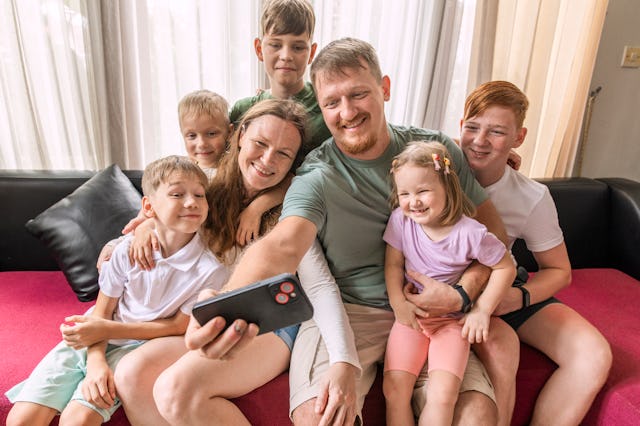Having More Siblings Could Affect Teen Mental Health
And maybe not in the way you might guess.

There are a lot of factors to consider when couples decide how big of a family they want, from child care needs to the size of their home. But a new study might add another conversation to the table: Will your kids’ mental health suffer if you have a big brood?
Researchers at Ohio State University have published new work in the Journal of Family Issues this month that found that the more siblings in a family, the more kids’ mental health suffered during their teenaged years.
The study surveyed two teenaged populations about their mental health and the size of their family: 9,400 eighth graders in China and 9,100 eighth graders in the United States. Both studies came to the same conclusions about siblings, teens, and mental health.
The scientists found that in China, only children had the best mental health, while in the United States, kids with zero or one sibling had the best mental health.
The more siblings a teen had, the poorer their mental health — and step-siblings seemed to contribute to the trend just as much as full or half-siblings. In addition, siblings that were born close together had poorer mental health than siblings who were spaced farther apart.
Why does this happen? While the study doesn’t explain the correlation, researchers have a pretty good guess that a lot of it has to do with resources: parents with more kids have less time, attention, and money to spend on each of their children.
Doug Downey, lead author of the study and professor of sociology at Ohio State University, calls this “research dilution” — and notes that the explanation fits since siblings born close together are often competing for the same resources from their parents.
“If you think of parental resources like a pie, one child means that they get all the pie — all the attention and resources of the parents,” he told Science Daily. “But when you add more siblings, each child gets fewer resources and attention from the parents, and that may have an impact on their mental health.”
However, that’s probably not the only factor at play here.
There’s also a “selectivity” explanation — that certain types of families have more kids. These could be families in different socioeconomic groups, families with different religious backgrounds, families without birth control resources, or families with different cultural values.
Finally, kids in bigger families could be raised differently because of their number of siblings — parents could run a stricter household to cut down on chaos, or teens could be roped into chores or child care before that goes beyond their age and experience.
In the past, other studies have found more cons to a large family, including lower test scores for kids, stricter upbringings, a higher chance of delinquency and addiction, and sicker moms.
Of course, coming from a big family with lots of siblings has its advantages, too. A study in Australia found that families with four or more siblings had higher overall life satisfaction. Another study found that kids from large families had better social skills in kindergarten.
The bottom line? More research on siblings and big families needs to be done, but taking these pros and cons into consideration when family planning isn’t a bad idea. And supporting reproductive rights, so that families can be in change of their own family size, will continue to be vital.
This article was originally published on